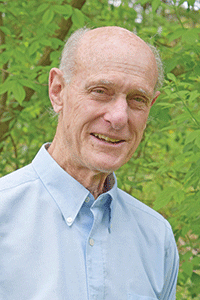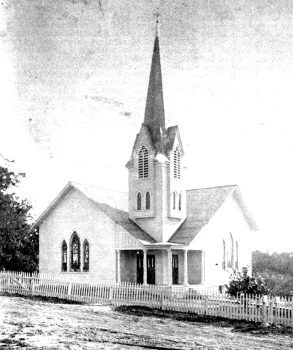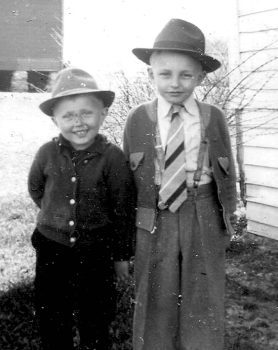
Part three of a series
Summer revivals, Christmas pageants, a hospital stay and even sore knees during Wednesday prayers are treasured memories for area historian David Beckman of attending South Ridge Church while growing up in the 1940s a few miles west of La Crescent.
The family worshipped twice on Sundays, starting with Sunday school for both children and adults before the traditional morning service, followed several hours later by an evening service. The morning highlight for David was the choir, which was blessed with many good voices.

Photo submitted
The evening service was much like the morning worship except it was shorter, a positive feature for young David. The choir did not sing in the evening, but there was often special music, including frequent performances by a vocal trio, consisting of David’s uncle and two aunts, who would practice in the afternoon while at Grandpa’s and Grandma’s for noon dinner.
David did not look forward to the Wednesday night prayer meetings, especially when it came time for everyone to kneel in the pews with elbows on the hard seat with hands folded. The older folks would begin to pray, ”usually in the same order and reciting the same praises and petitions. As Grandpa got older, his prayers got slower and longer, at least they seemed to be more repetitive and go on forever.
“After a short time, I would nudge Mother and whisper that I needed to sit down because my knees hurt. Eventually, she would whisper back, ”OK, but be quiet.” Strange, I could play with my tractors and trucks on the hardwood kitchen floor for hours and my knees never hurt.”
Worship services went well until David’s parents realized that he and his brother Paul were sitting together and “touching each other.” Mother would then position herself between the restless lads. “Paul thought his sole purpose in life was to bug me until I did something that got me into trouble. I must admit, he was very good at it. His favorite was getting me to laugh out loud at Wednesday night prayer meetings when we would make faces at each other while kneeling.”
One week each summer was devoted to evening revival meetings with sermons by guest ministers. The fervor and exhortations could be discomforting to children. David said, “I have to admit I did not like some of those services. Sometimes, the minister’s voice got really loud, and he’d shake his finger at us. A scary moment for a young boy, who didn’t like to be scolded even though he probably deserved it.”
One summer at the revival, David and the other confirmands were seated, as instructed, in the front pew. Their home pastor had told them to respond to the altar call and publicly accept Jesus Christ as their personal savior. That particular evening, Clair Burow (about age six) came up to sit by David. “When the last altar call went out, we all looked at each other, shrugged our shoulders, exited the pew and obediently marched to the front of the altar railing. When we were asked to kneel, I looked down and saw young Clair was kneeling beside me.”

Photo submitted
In that farming community, the church highlight in autumn was the annual Harvest Home Sunday, expressing “gratitude for the harvest that sustained the community.” The altar would be decorated with samples of what had been produced that year. The usual morning service would be followed by dinner and then an afternoon service at 2 p.m. The guest preacher at both services would usually be a former minister of the congregation or the bishop from the synod office. Especially memorable for David were appearances by former members of the congregation who had gone on to became ministers. The only downside for David was “we kids couldn’t eat until all the visitors had eaten.” This traditional service has continued until the present.
“How could anyone not love the Christmas Eve service!” exclaimed David, where he says the pageant has been performed longer than any other in the area. The front of the church was completely cleared, creating a large stage where the Christmas story was enacted with speaking parts. Before the formal pageant began, the youngest children each recited a “piece,” as it was termed. “This was a very apprehensive time for me,” admitted David, “because it was difficult for me to memorize anything. I don’t think I ever spoke my piece without stuttering and needing to being prompted.”
When he became old enough to be in the pageant, he “desperately wanted” to be Joseph, but lamented always being a “lowly shepherd” – until one year when he got to be a king and “wear a crown, which was much better than having a piece of cloth tied around my head with a rope that dangled in my face.” David never did receive permission to be Joseph – until, as an octogenarian, he spoke at the 2022 Harvest Home Service.
And there were the Christmas bags. “Although we were not what I would call poor,” recalled David, “there were still few times when candy and fruit was plentiful in our house.” But the Christmas Eve bag would have candy, nuts, an orange and an apple. Arriving home and searching his bag, David was usually disappointed not to find at least one Brazil nut.
David’s earliest church-related memory did not occur at church, but instead, at St. Francis Hospital in La Crosse, where at age four, he was being treated for pneumonia. Reverend Nash, newly assigned to South Ridge Church, came to visit and gave him a prayer book. That little book would eventually need repair by his mother. “The binding was not worn out from me reading the book. Rather, it was worn out from me looking at the pictures. I always preferred books that had lots of pictures.”
South Ridge Tabor Church, originally part of the Evangelical Association, through a 1946 merger became part of the Evangelical United Brethren (E.U.B.) until a 1968 merger made it South Ridge United Methodist Church.
Source: David Beckman’s address to the congregation at the Harvest Home Service on October 2, 2022


Leave a Reply